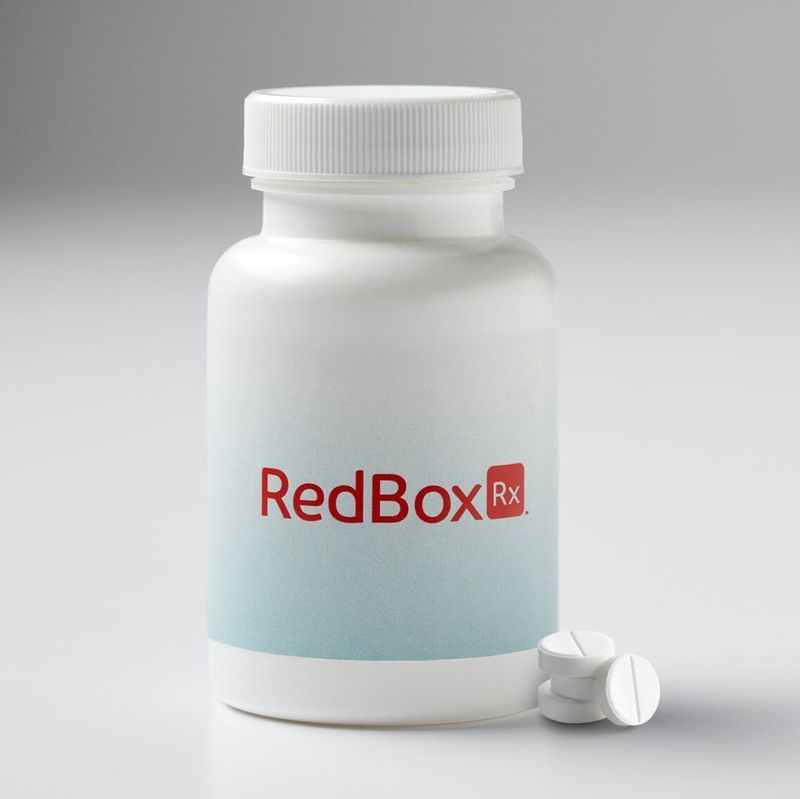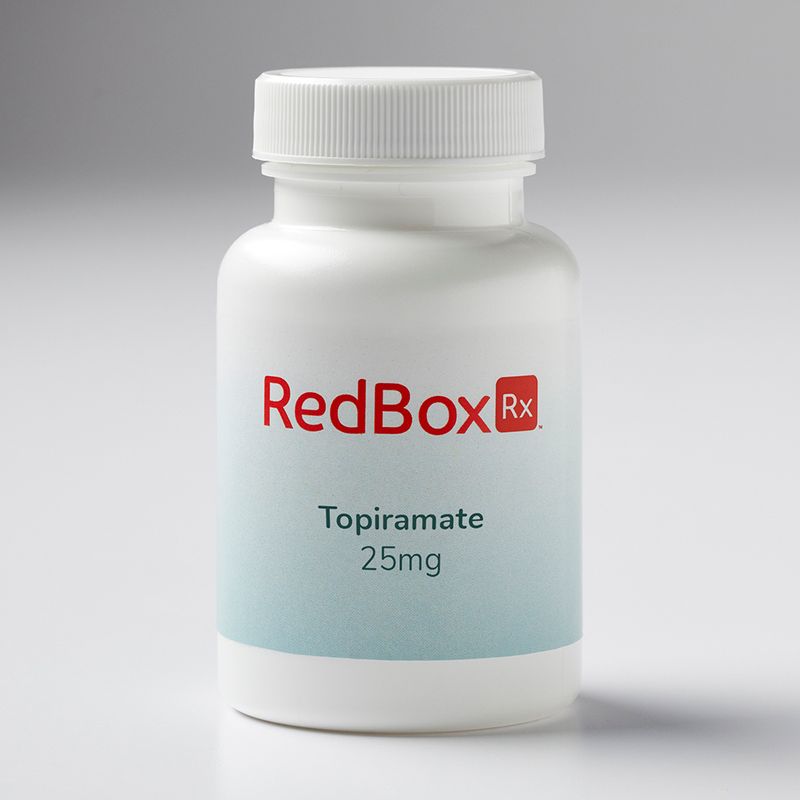Topiramate (Generic Topamax) FAQs
-
Topiramate is used to prevent migraine headaches but not to relieve the pain of migraine headaches when they occur. Topiramate is in a class of medications called anticonvulsants. It works by decreasing abnormal excitement in the brain.
-
Topiramate comes as a tablet and usually taken with or without food once or twice a day. Take topiramate at around the same time(s) every day. Follow the directions on your prescription label carefully, and ask your doctor or pharmacist to explain any part you do not understand. Take topiramate exactly as directed. Do not take more or less of it or take it more often than prescribed by your doctor.
Topiramate tablets have a bitter taste so you should swallow them whole. It is especially important that you not take topiramate tablets that have been broken for any length of time because tablets that are broken may lose their effectiveness over time.
Topiramate may control your migraines but will not cure your condition. Continue to take topiramate even if you feel well. Do not stop taking topiramate without talking to your doctor, even if you experience side effects such as unusual changes in behavior or mood.
Your doctor or pharmacist will give you the manufacturer's patient information sheet (Medication Guide) when you begin treatment with topiramate and each time you refill your prescription. Read the information carefully and ask your doctor or pharmacist if you have any questions. You can also visit the Food and Drug Administration (FDA) website (http://www.fda.gov/Drugs) or the manufacturer's website to obtain the Medication Guide.
-
Before taking topiramate,
tell your doctor and pharmacist if you are allergic to topiramate, any other medications, or any of the ingredients in topiramate tablets, sprinkle capsules, and extended-release capsules. Ask your pharmacist for a list of the ingredients.
tell your doctor if you have metabolic acidosis (a disturbance in the body's acid-base balance that results in excessive acidity of the blood) and you are taking metformin (Fortamet, Glucophage, Riomet, others). Your doctor will probably tell you not to take metformin if you have metabolic acidosis and you are taking this of medication.
tell your doctor and pharmacist what prescription and nonprescription medications, vitamins, nutritional supplements, and herbal products you are taking or plan to take. Be sure to mention any of the following: acetazolamide (Diamox); amitriptyline; anticoagulants ('blood thinners') such as warfarin (Coumadin); antidepressants; antihistamines; aspirin and other nonsteroidal anti-inflammatory medications (NSAIDs) such as ibuprofen (Advil, Motrin) and naproxen (Aleve, Naprosyn); digoxin (Lanoxin); hormonal contraceptives (birth control pills, patches, rings, implants, or injections); hydrochlorothiazide (Microzide, Oretic); lamotrigine (Lamictal); lithium (Lithobid); medications for motion sickness, ulcers, or urinary problems; metformin (Fortamet, Glucophage, Riomet, others); other medications for seizures such as carbamazepine (Epitol, Equetro, Tegretol, Teril), phenytoin (Dilantin, Phenytek), valproic acid (Depakene), and zonisamide (Zonegran); and pioglitazone (Actos, in Actoplus Met ER). Your doctor may need to change the doses of your medications or monitor you carefully for side effects.
tell your doctor if you or any family members have or have ever had kidney stones, and if you have ever thought about killing yourself or tried to do so. Also tell your doctor if you have or have ever had metabolic acidosis (a disturbance in the body's acid-base balance that results in excessive acidity of the blood); osteopenia, osteomalacia, or osteoporosis (conditions in which the bones are soft or brittle and may break easily); diabetes; glaucoma (a type of eye disease); any disease that affects your breathing such as asthma or chronic obstructive pulmonary disease (COPD); depression or abnormal moods; a growth problem; or liver or kidney disease. Also tell your doctor if you have diarrhea or if you develop diarrhea during your treatment.
tell your doctor if you are pregnant, plan to become pregnant, or are breast-feeding. If you are pregnant or plan to become pregnant, your doctor may prescribe a different medication instead of topiramate because topiramate may harm the fetus. If you do not plan to become pregnant, you should use birth control to prevent pregnancy during your treatment with topiramate. Talk to your doctor about what type of birth control you should use, because taking topiramate may decrease the effectiveness of some types of birth control. If you become pregnant while you are taking topiramate, call your doctor right away, but do not stop taking topiramate before talking to your doctor.
if you are having surgery, including dental surgery, tell the doctor or dentist that you are taking topiramate.
you should know that topiramate may make you drowsy, dizzy, confused, or unable to concentrate. Do not drive a car or operate machinery until you know how this medication affects you.
if you are taking topiramate to control seizures, you should know that you may continue to have seizures during your treatment. You may need to avoid activities such as swimming, driving, and climbing so that you will not harm yourself or others if you lose consciousness during a seizure.
tell your doctor if you if you drink alcohol. You should not drink alcohol within 6 hours before and 6 hours after you take extended-release capsules (Trokendi XR brand only). Your doctor will probably tell you not to drink alcohol while taking topiramate.
you should know that topiramate can prevent you from sweating and make it harder for your body to cool down when it gets very hot. This happens most often in warm weather. Avoid exposure to heat, drink plenty of fluids and tell your doctor if you have a fever, headache, muscle cramps, or an upset stomach, or if you are not sweating as usual.
you should know that you may be more likely to develop a kidney stone while you are taking topiramate. Drink 6 to 8 glasses of water every day to prevent kidney stones from forming.
you should know that your mental health may change in unexpected ways and you may become suicidal (thinking about harming or killing yourself or planning or trying to do so) while you are taking topiramate for the treatment of epilepsy, mental illness, or other conditions. A small number of adults (about 1 in 500 people) who took anticonvulsants such as topiramate to treat various conditions during clinical studies became suicidal during their treatment. Some of these people developed suicidal thoughts and behavior as early as 1 week after they started taking the medication. There is a risk that you may experience changes in your mental health if you take an anticonvulsant medication such as topiramate, but there may also be a risk that you will experience changes in your mental health if your condition is not treated. You and your doctor will decide whether the risks of taking an anticonvulsant medication are greater than the risks of not taking the medication. You, your family, or your caregiver should call your doctor right away if you experience any of the following symptoms: panic attacks; agitation or restlessness; new or worsening irritability, anxiety, or depression; acting on dangerous impulses; difficulty falling or staying asleep; aggressive, angry, or violent behavior; mania (frenzied, abnormally excited mood); talking or thinking about wanting to hurt yourself or end your life; withdrawing from friends and family; preoccupation with death and dying; giving away prized possessions; or any other unusual changes in behavior or mood. Be sure that your family or caregiver knows which symptoms may be serious so they can call the doctor if you are unable to seek treatment on your own.
-
Talk to your doctor about increasing the amount of food you eat if you lose weight while you are taking topiramate.
Talk to your doctor before changing your diet or beginning any type of weight loss program. Do not follow a ketogenic diet (a high-fat, low-carbohydrate diet used to control seizures) or any other high-fat, low-carbohydrate diet, such as the Atkins diet, while you are taking this medication.
-
Take the missed dose as soon as you remember it. However, if it is less than 6 hours before you are scheduled to take your next dose, skip the missed dose and continue your regular dosing schedule. Do not take a double dose to make up for a missed one.
-
Topiramate may cause other side effects. Tell your doctor if any of these symptoms are severe or do not go away:
numbness, burning, or tingling in the hands or feet
slowed reactions
nervousness
headache
drowsiness
weakness
uncontrollable shaking of a part of the body
uncontrollable eye movements
weight loss
constipation
heartburn
change in ability to taste food
dry mouth
nosebleed
teary or dry eyes
back, muscle, leg, or bone pain
missed menstrual periods
excessive menstrual bleeding
unusual bleeding or bruising
Some side effects can be serious. If you experience any of the following symptoms or those listed in the SPECIAL PRECAUTIONS section, call your doctor immediately:
rash, skin blisters, or skin peeling
blurred vision
loss of vision
double vision
eye pain
eye redness
worsening of seizures
feeling cold, chills, or low body temperature
difficulty concentrating
speech problems, especially difficulty thinking of specific words
confusion
memory problems
loss of coordination
pounding or irregular heartbeat
chest pain
shortness of breath
trouble breathing
fast, shallow breathing
inability to respond to things around you
excessive tiredness
diarrhea
nausea
vomiting
stomach pain
loss of appetite
intense back or side pain
bloody, cloudy, or foul-smelling urine
constant need to urinate
difficulty urinating or pain when urinating
fever or other signs of infection
Topiramate may cause osteoporosis (a condition in which bones can break more easily) in adults.Talk to your doctor about the risks of taking topiramate.
Topiramate may cause other side effects. Call your doctor if you have any unusual problems while taking this medication.
If you experience a serious side effect, you or your doctor may send a report to the Food and Drug Administration's (FDA) MedWatch Adverse Event Reporting program online (http://www.fda.gov/Safety/MedWatch) or by phone (1-800-332-1088).
-
Topiramate is $20 per month at RedBox Rx. No insurance required and no membership fees.
Our online consultation for migraines & headaches costs only $25.
-
Keep this medication in the container it came in, tightly closed, and out of reach of children. Tablets and extended-release capsules should be stored at room temperature and away from excess heat and moisture (not in the bathroom). Sprinkle capsules should be stored at or below 77°F (25°C). Never store broken tablets, capsules, or mixtures of sprinkles and soft food. These should be used right away or discarded.
It is important to keep all medication out of sight and reach of children as many containers (such as weekly pill minders and those for eye drops, creams, patches, and inhalers) are not child-resistant and young children can open them easily. To protect young children from poisoning, always lock safety caps and immediately place the medication in a safe location - one that is up and away and out of their sight and reach. http://www.upandaway.org
Unneeded medications should be disposed of in special ways to ensure that pets, children, and other people cannot consume them. However, you should not flush this medication down the toilet. Instead, the best way to dispose of your medication is through a medicine take-back program. Talk to your pharmacist or contact your local garbage/recycling department to learn about take-back programs in your community. See the FDA's Safe Disposal of Medicines website (http://goo.gl/c4Rm4p) for more information if you do not have access to a take-back program.
-
In case of overdose, call the poison control helpline at 1-800-222-1222. Information is also available online at https://www.poisonhelp.org/help. If the victim has collapsed, had a seizure, has trouble breathing, or can't be awakened, immediately call emergency services at 911.
Symptoms of overdose may include the following:
seizures
drowsiness
speech problems
blurred vision
double vision
trouble thinking
tiredness
loss of coordination
loss of consciousness
dizziness
stomach pain
vomiting
agitation
depression
loss of appetite
pounding or irregular heartbeat
fast, shallow breathing
-
Keep all appointments with your doctor and the laboratory. Your doctor will order certain lab tests to check your body's response to topiramate.
Do not let anyone else take your medication. Ask your pharmacist any questions you have about refilling your prescription.
It is important for you to keep a written list of all of the prescription and nonprescription (over-the-counter) medicines you are taking, as well as any products such as vitamins, minerals, or other dietary supplements. You should bring this list with you each time you visit a doctor or if you are admitted to a hospital. It is also important information to carry with you in case of emergencies.
-
Topamax®
-
We offer a variety of prescription medication options for migraines and headaches including:

Affordable migraine and headache treatment online.
Whether you are looking for preventative or acute treatment of migraines and headaches, RedBox Rx offers FDA-approved prescription medications to get you feeling like yourself again. Your first step towards relief is to start an online consultation with one of our experienced, licensed medical providers.
- No membership or subscription fees.
- Low-cost telehealth consult with a licensed medical provider.
- Topiramate starting at $20 per month.
- Confidential, private and secure.
- Free standard shipping or expedited/overnight available.
Sorry, we’re closed for today. Our U.S. licensed medical providers are available daily 7 a.m. to 9 p.m. CST via live video visit. We look forward to serving you soon. Email us anytime at [email protected].
How RedBox Rx Works
What Our Patients Are Saying
-
“
They made service quick and easy to use. The health information that you complete wasn’t horrible and they did request recent lab work. I completed the information Monday and received my migraine medication on Thurs!
Heather S.
-
“
First time I used RedBox Rx and completely satisfied! I filled out the online consultation which was very thorough and that impressed me. Then less than 24 hours later I had an approval from a doctor for migraine medicine. Having no insurance at this time, this was easy and safe. I will use RedBox Rx again.
Constance W.
-
“
I can't believe the quality of care, not to mention how easy the site is to use! It is by far the best site I've found so far! Thank you RedBox Rx.
Laura K.

Get topiramate prescribed online.
Take a 5-minute online assessment, then one of our experienced, licensed medical providers will review and determine whether topiramate or another medication is right for you.
Sorry, we’re closed for today. Our U.S. licensed medical providers are available daily 7 a.m. to 9 p.m. CST via live video visit. We look forward to serving you soon. Email us anytime at [email protected].


